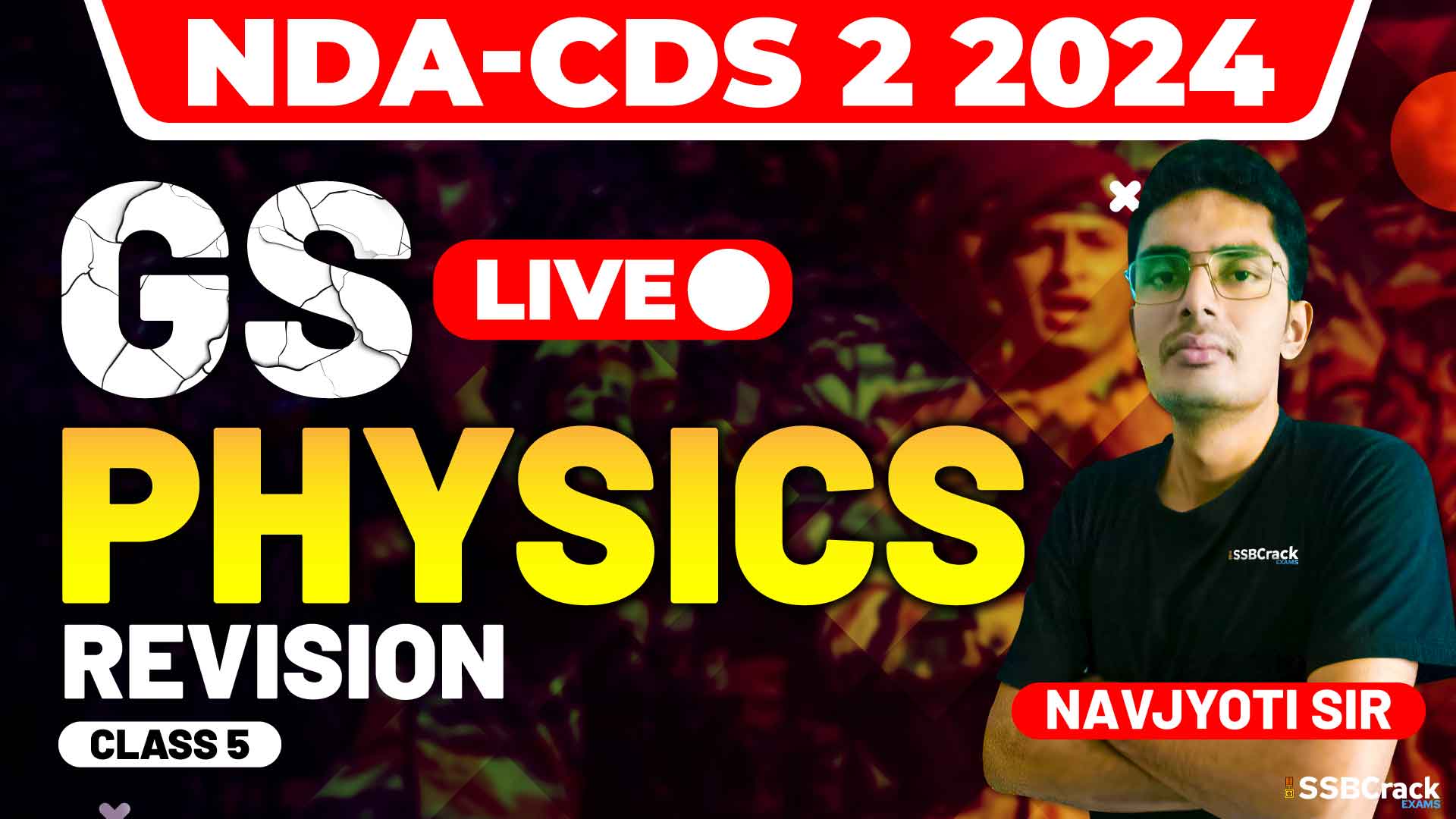In preparation for the NDA and CDS exams, mastering key concepts in Physics, particularly in topics like Work, Energy, Power, Gravitation, and Hydrostatics, is crucial. These topics are not only fundamental to understanding the physical world but also frequently feature in the exam’s multiple-choice questions (MCQs). This article highlights the key concepts covered in a recent revision class and offers strategies to tackle MCQs effectively in these areas.
Work, Energy, and Power: The Fundamentals
Work: In physics, work is done when a force acts on an object and causes it to move. The amount of work done depends on both the force applied and the distance over which it acts. Understanding the concept of work is essential, as it forms the basis for more complex topics like energy and power.
Energy: Energy is the capacity to do work. It exists in various forms, such as kinetic energy (energy of motion) and potential energy (stored energy). The conservation of energy principle, which states that energy cannot be created or destroyed but only transformed from one form to another, is a cornerstone of physics.
Power: Power is the rate at which work is done or energy is transferred. It’s a measure of how quickly energy is being used or converted. Grasping the relationship between work, energy, and power is vital for solving problems related to machinery, electricity, and various physical processes.
MCQ Strategy: When tackling MCQs on Work, Energy, and Power, focus on understanding the basic principles and relationships between these concepts. For example, you might be asked to calculate the work done given the force and distance, or to determine the power output given work done over time. Practice by breaking down complex problems into smaller parts and applying the relevant principles step by step.
Gravitation: Understanding the Forces That Shape Our Universe
Newton’s Law of Gravitation: This law states that every mass exerts an attractive force on every other mass. The force is proportional to the product of the two masses and inversely proportional to the square of the distance between them. Understanding this law is key to solving problems related to planetary motion, orbits, and gravitational fields.
Gravitational Potential Energy: This is the energy stored in an object due to its position in a gravitational field. It’s an extension of the concept of potential energy, applied specifically to situations involving gravity.
Kepler’s Laws: These laws describe the motion of planets around the sun and are essential for understanding orbital dynamics. Familiarity with Kepler’s Laws can help in solving problems related to the motion of satellites and other celestial bodies.
MCQ Strategy: For questions on Gravitation, pay close attention to the details provided in the question. Often, MCQs will test your ability to apply Newton’s Law of Gravitation or Kepler’s Laws to real-world scenarios. Practice solving problems that involve calculating gravitational force, potential energy, and orbital parameters.
Hydrostatics: The Study of Fluids at Rest
Pressure: In hydrostatics, pressure is a key concept. It’s the force exerted per unit area on the surface of a fluid. Understanding how pressure varies with depth in a fluid is crucial for solving problems related to fluid mechanics.
Pascal’s Law: This principle states that a change in pressure applied to an enclosed fluid is transmitted undiminished to all parts of the fluid and the walls of its container. This law is fundamental to understanding hydraulic systems and their applications.
Buoyancy and Archimedes’ Principle: Buoyancy is the upward force that a fluid exerts on an object placed in it. Archimedes’ Principle states that the buoyant force is equal to the weight of the fluid displaced by the object. These concepts are important for solving problems related to floating and submerged objects.
MCQ Strategy: When approaching MCQs on Hydrostatics, visualize the physical situation described in the question. Use diagrams if necessary to help understand the forces at play. Familiarize yourself with the key principles like Pascal’s Law and Archimedes’ Principle, as questions often require direct application of these concepts.
General Strategies for MCQs on Work, Energy, Power, Gravitation, and Hydrostatics
- Understand the Basics: Ensure that you have a solid grasp of the fundamental concepts. Many MCQs will test your understanding of basic principles rather than complex calculations.
- Practice Regularly: Regular practice is key to mastering MCQs. Use previous years’ question papers and mock tests to familiarize yourself with the type of questions asked in the NDA and CDS exams.
- Read Questions Carefully: MCQs often include details that are crucial for finding the correct answer. Pay close attention to the wording of the question and the units of measurement used.
- Eliminate Wrong Answers: If you’re unsure of the correct answer, try to eliminate the options that are clearly incorrect. This increases your chances of choosing the right answer from the remaining options.
- Time Management: During the exam, time management is crucial. Practice solving questions quickly and efficiently to ensure that you can complete the paper within the allotted time.
- Use Logic and Intuition: Sometimes, even if you don’t know the exact answer, you can use logic or intuition to narrow down the choices. Understanding the context of the question can often lead you to the correct answer.
Conclusion
Preparation for the NDA and CDS exams requires a deep understanding of physics concepts, particularly in areas like Work, Energy, Power, Gravitation, and Hydrostatics. By focusing on the fundamental principles, practicing regularly, and using effective strategies for solving MCQs, you can enhance your performance in these crucial sections of the exam. Remember, consistent effort and a clear understanding of the concepts will pave the way for success.







